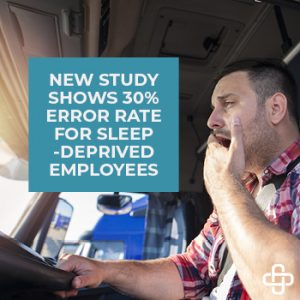 A new study conducted by Michigan State University’s Sleep and Learning Lab should have the attention of every employer. It further drives home the importance of health and wellness and reiterates the impact on workplace safety, especially when performing tasks that involve multiple steps.
A new study conducted by Michigan State University’s Sleep and Learning Lab should have the attention of every employer. It further drives home the importance of health and wellness and reiterates the impact on workplace safety, especially when performing tasks that involve multiple steps.
Conducting the Study
The researchers recruited 138 people to participate in the overnight sleep assessment; 77 stayed awake all night and 61 went home to sleep.
All participants took two separate cognitive tasks in the evening:
- Measuring reaction time to a stimulus
- Measuring a participant’s ability to maintain their place in a series of steps without omitting or repeating a step – even after sporadic interruptions
The participants then repeated both tasks in the morning to see how sleep-deprivation affected their performance.
Conclusive Findings
“After being interrupted there was a 15% error rate in the evening and we saw that the error rate spiked to about 30% for the sleep-deprived group the following morning,” said Michelle Stepan, MSU doctoral candidate. “The rested participants’ morning scores were similar to the night before.”
“Our research showed that sleep deprivation doubles the odds of making placekeeping errors and triples the number of lapses in attention, which is startling,” said Kimberly Fenn, professor of psychology and director of the Sleep and Learning Lab. “Sleep-deprived individuals need to exercise caution in absolutely everything that they do, and simply can’t trust that they won’t make costly errors. Oftentimes – like when behind the wheel of a car – these errors can have tragic consequences.”
Published in the Journal of Experimental Psychology: General, the research is not only one of the largest studies, but also the first to assess how sleep deprivation impacts placekeeping – or, the ability to complete a series of steps without losing one’s place, despite potential interruptions. This study builds on prior research from MSU’s sleep scientists to quantify the effect lack of sleep has on a person’s ability to follow a procedure and maintain attention.
By sharing their findings on the separate effects sleep deprivation has on cognitive function, Fenn – and co-authors Michelle Stepan, MSU doctoral candidate and Erik Altmann, professor of psychology – hope that people will acknowledge how significantly their abilities are hindered because of a lack of sleep.

Holly is an ER nurse by trade, but loves content marketing. She was born outside the box and believes everything is better with “sprinkles and sparkles”. She is passionate about impacting lives and uses marketing as her platform for sharing practical solutions to address real life occupational health challenges.
Find out more about our Injury Case Management services or our Occupational Health Programs.










